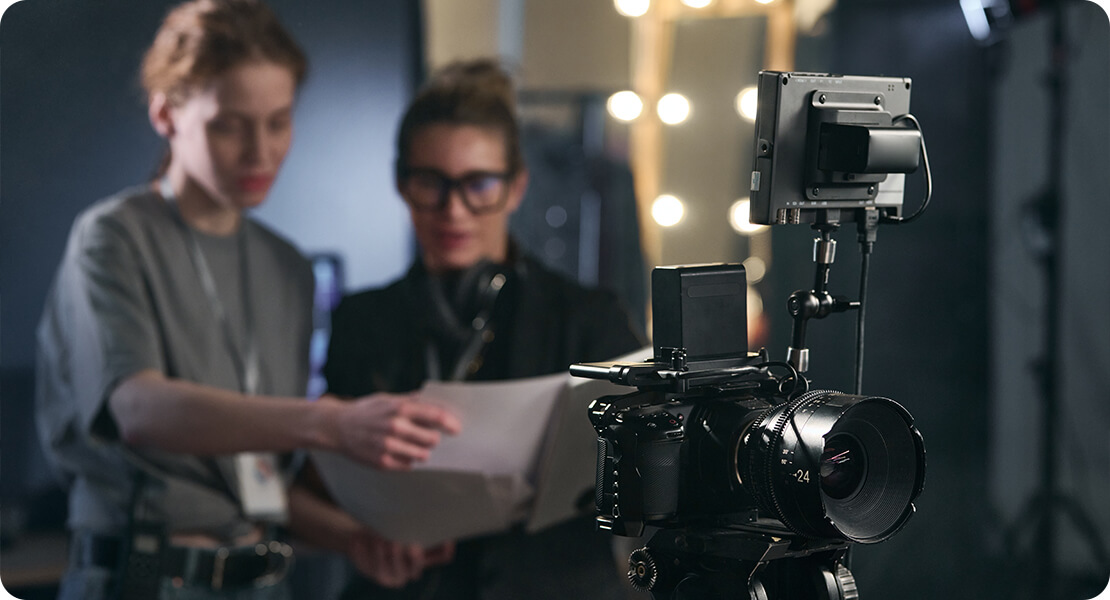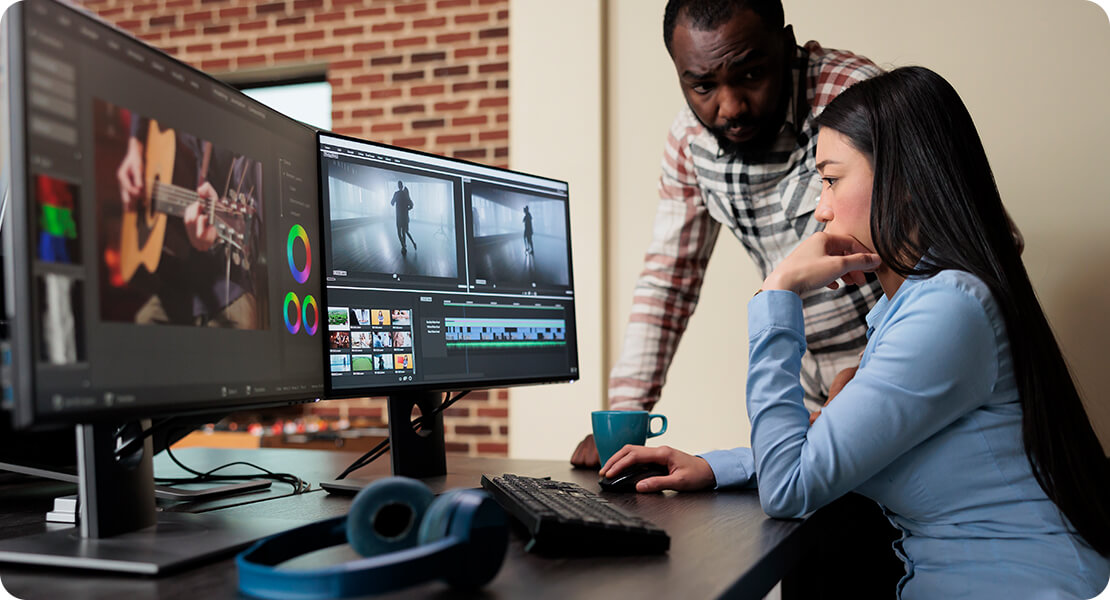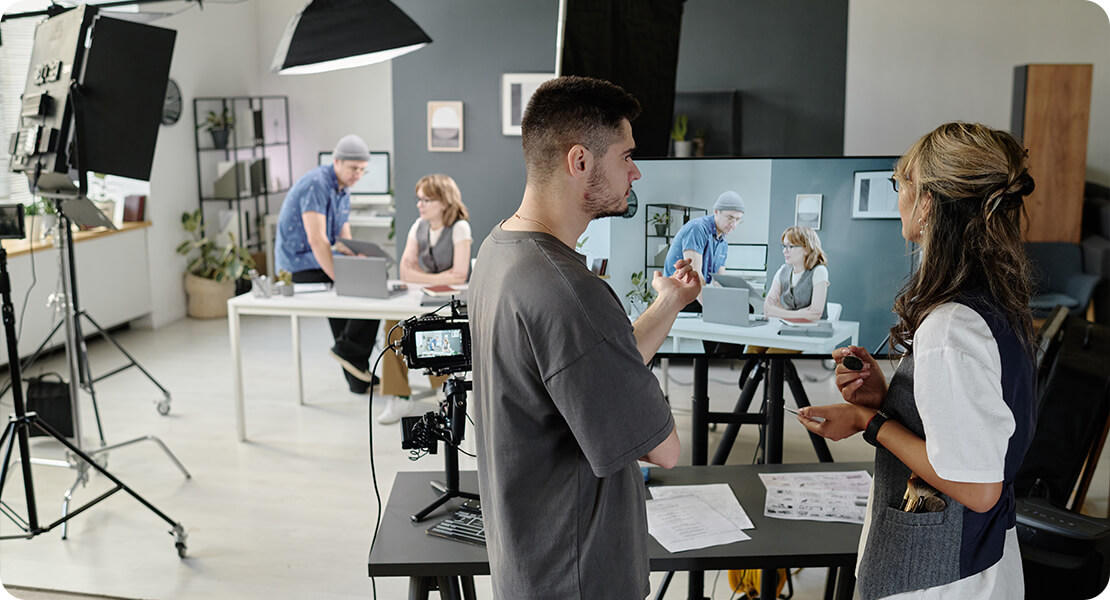
Introduction: So, You Want to Make Videos for a Living?
If you’ve ever watched a film, music video, or YouTube series and thought, “I want to do that,” you’re not alone. Video production has exploded in recent years, and in 2025, there’s more demand than ever—from branded content and online ads to documentaries and live-streaming events. But breaking into the industry can feel overwhelming, especially if you’re starting from scratch.
The good news? You don’t need a fancy degree or expensive gear to begin. What you do need is a strong foundation, the right tools, and the determination to keep learning and improving. This guide is here to walk you through it—from the basics of education and equipment, to shooting your first projects and landing your first paid jobs.
Whether you dream of directing feature films or producing slick videos for social media, this step-by-step guide will give you the clarity and confidence to get started.
Learn the Craft: Education and Self-Teaching
You don’t have to go to film school to be a video producer, but you do need to know your stuff. The first step is to build a strong understanding of the fundamentals: camera settings, lighting, sound, editing, and storytelling. If university is an option, consider a degree in film production, digital media, or a similar field.
But for many, online courses offer more flexibility. Platforms like Skillshare, LinkedIn Learning, and YouTube are packed with tutorials on everything from colour grading to shooting with natural light. Just be sure to follow content from professionals with real-world experience.
Watching tutorials alone won’t make you a filmmaker—you’ll need to put what you learn into practice. Start by replicating scenes from your favourite films or creating short test shoots.
Over time, you’ll build technical confidence and begin developing your own creative voice. Make learning a habit, not a phase. The video world evolves quickly, and staying up to date is part of the job.
Get the Right Gear—But Start Simple
It’s easy to fall into the trap of thinking you need a £5,000 camera to be taken seriously. You don’t. When you’re just starting out, your smartphone or a basic mirrorless camera is more than enough.
Focus on gear that will help you learn the basics without overwhelming your budget. A tripod, a lapel mic, and a couple of LED lights will go a long way. If you’re shooting interviews or vlogs, audio quality is arguably more important than the camera—people will forgive slightly soft video, but not muffled sound.
As you grow, you can invest in better kit: maybe a DSLR or cinema camera, a gimbal, or pro-grade audio gear. But don’t let the lack of top-tier equipment stop you from creating. Many pros started with hand-me-down cameras or borrowed gear. What’s important is how you use what you have.
Great framing, natural light, and solid storytelling always trump flashy gear. Remember: your kit is just a tool—your skill is what makes it shine.
Your First Projects: Practice with Purpose
You’ll only get better by doing. Once you’ve got a basic setup and some technical know-how, it’s time to start creating. Begin with projects that interest you and allow you to experiment—short films, music videos, travel vlogs, or even mini-docs about local events.
Offer to film for friends, local artists, or community groups. These unpaid or low-budget gigs may not pay the bills, but they’ll give you experience, portfolio content, and lessons you can’t learn from books.
Keep each project focused: maybe one is about nailing natural lighting, another about capturing clear dialogue. With every shoot, review your footage and edit critically.
What worked? What fell flat? What could be better next time? Don’t aim for perfection—aim to finish. You’ll learn far more from ten scrappy completed videos than one you’ve been polishing for six months.
And share your work online. Feedback, even when it stings, helps you grow faster. Every project you make is a step closer to paid opportunities.
Master the Edit: Post-Production Skills Matter
Shooting video is only half the job—the real magic often happens in the edit. Learning how to cut footage, balance sound, and add transitions or motion graphics is essential.
Start with beginner-friendly software like iMovie or DaVinci Resolve (which has a free version) before moving to industry standards like Adobe Premiere Pro or Final Cut Pro. Editing teaches you what to shoot better next time, and it gives you the power to shape raw footage into something watchable.

Sound design, colour correction, and pacing can elevate an average shoot into a professional-looking video.
Don’t rush this stage—spend time experimenting. Learn the keyboard shortcuts. Get comfortable with timelines and effects. Many producers find they develop a style in the edit suite before they ever define it behind the camera.
Plus, post-production skills are highly sought-after, meaning you can offer editing as a standalone service too. If you can shoot and edit, you’re already ahead of half the competition.
Build a Portfolio That Tells a Story
When it comes to finding work, your portfolio is your golden ticket. It’s not about having dozens of videos—it’s about showcasing your strongest work and the kind of projects you want more of. Focus on quality over quantity.
Choose 3–6 pieces that show different skills: maybe a short documentary, a product video, a narrative short, and a social media edit. Think about how you present your work. A clean, simple website with embedded videos and short descriptions is far more professional than just linking to random YouTube uploads.
Include who the project was for, what your role was, and what you learned. If you’re just starting out and don’t have client work yet, personal projects are perfectly valid. Just make sure they’re polished.
Your reel—or showreel—should be a fast-paced, one-minute highlight of your best shots, edited to music. Treat your portfolio as a living project. Keep it updated, remove weaker pieces, and use it to pitch yourself confidently to potential clients or employers.
Start Small, but Charge Something
Once you’ve got a few projects under your belt, it’s time to start getting paid. Yes, even if you’re still learning. You don’t need to jump straight into full-day rates—start with small businesses, creators, or charities that need affordable content. Offer fair, entry-level pricing but don’t work for exposure.
If someone is using your video to promote themselves or their business, it has value. Charge enough to cover your time, travel, and equipment wear, even if it’s modest. This helps you learn how to invoice, price your work, and communicate with clients professionally—skills just as important as filmmaking.
As you gain confidence, raise your rates. Use online freelance platforms cautiously—they’re saturated and often underpay. Instead, ask for referrals, post your work on social media, and join local Facebook or Discord groups for creatives. Every paid job, no matter how small, gets you one step closer to a sustainable video career.
Network Like Your Career Depends on It (Because It Does)
In the creative industries, who you know really can make a difference. That doesn’t mean you need connections in high places—it means showing up, being helpful, and staying visible.
Attend local film screenings, workshops, or networking events. Say yes to collaborative projects, even if they’re unpaid, if they put you in touch with other creatives. Join online groups, comment on other people’s work, and share your own progress. Don’t just post finished videos—share behind-the-scenes clips, bloopers, lessons learned. People love seeing growth.
Networking isn’t about being fake or pushy—it’s about being part of a community. Many video jobs aren’t advertised—they’re passed on through word of mouth.

If you’re top of mind and easy to work with, people will think of you when opportunities come up. Follow production companies, agencies, and freelancers in your area. Let them know you’re available. Be professional, be kind, and always deliver what you promise. Reputation is everything in this game.
Learn to Wear Multiple Hats
Video production is rarely just about pointing a camera. As a beginner, you’ll often be the director, camera operator, editor, sound designer, and scriptwriter—all in one. While it may seem overwhelming, learning these roles gives you a huge advantage.
You’ll gain a better understanding of how each piece fits together, which makes you a more well-rounded creator. And when you do start collaborating with others, you’ll be able to communicate more effectively because you understand their job. Over time, you may specialise—but in the early days, being versatile opens more doors.
Want to shoot music videos? Learn how to storyboard. Dream of working on documentaries? Understand interview techniques and research. The broader your skill set, the more valuable you become. Just be careful not to spread yourself too thin. Master the basics of each role before moving on. Focus and consistency beat trying to do everything at once.
Understand Your Audience and Platforms
One of the biggest shifts in video production over the last decade is how content is consumed. In 2025, understanding where your video will live is just as important as how it’s made.
A video for YouTube isn’t the same as one for TikTok, LinkedIn, or broadcast TV. Each platform has its quirks—aspect ratio, duration, tone, and audience expectations. If you’re creating for social media, you’ll need to hook viewers within the first few seconds, optimise for silent playback, and potentially shoot in vertical format. For brand content, knowing the client’s goals—awareness, conversion, engagement—will shape the way you tell the story.
Even within a single platform like Instagram, a Reel and a Story require different approaches. As a beginner, start by experimenting with different formats. Try cutting a single project into multiple versions for different platforms.
Pay attention to analytics—how long people watch, where they drop off, what gets shared. The more you understand how audiences behave, the better you’ll become at creating content that connects. Ultimately, a great video isn’t just technically well-made—it’s content that delivers impact where it matters.
Stay Organised and Professional Behind the Scenes
Creativity may get you noticed, but professionalism gets you hired again. As you grow in your video production journey, treat it like a business. Keep your files organised with consistent folder structures and clear file naming.
Back up everything—twice. Learn to write a basic treatment or proposal for client jobs. Get comfortable creating quotes and invoices, and use contracts to protect both you and the client. Time management is also critical—show up on time to shoots, meet your deadlines, and communicate clearly if things go off track.

Even something as simple as responding to emails promptly can set you apart. Set up a professional email address and create branded templates for proposals and delivery. These small touches build trust. Clients don’t just want a creative—they want someone reliable.
As you begin to juggle multiple projects, use tools like Trello, Notion, or Google Calendar to stay on top of it all. Being organised frees up mental space for creativity, and shows others that you’re serious about your craft.
Embrace Feedback and Keep Evolving
Feedback is one of the most valuable tools you’ll encounter in your video production journey—but only if you’re open to it. In the early stages, it’s tempting to take criticism personally, especially when you’ve poured your time and creativity into a project.
But constructive feedback, whether from a client, collaborator, or even a YouTube commenter, is how you sharpen your skills. Ask for it regularly. When showing your work, don’t just look for praise—ask what could be improved.
Learn to separate yourself from your output so you can grow without ego getting in the way. At the same time, develop a strong creative filter. Not all feedback is useful, and part of being a good producer is knowing when to stick to your vision and when to adapt.
As your experience grows, so will your confidence in making those calls. Surround yourself with people who challenge you creatively, not just those who say your work is “great.”
Growth in this industry is constant. The best producers never stop evolving—they’re always refining their voice, learning new techniques, and adapting to the ever-changing media landscape. So be brave, stay curious, and let feedback fuel your development, not derail it.
Create Your Own Opportunities
While it’s important to apply for jobs and pitch to clients, don’t wait around for others to give you permission to create. Some of the most successful people in video production started by making content for themselves. Want to work in music videos? Shoot one for a local band.
Dream of making documentaries? Start with a story from your neighbourhood. These passion projects can become powerful portfolio pieces that show your style, skill, and initiative. They also allow you complete creative freedom—something you don’t always get on paid jobs.
Plus, self-initiated work often gets shared widely, attracting new clients or collaborators. If you’re trying to break into a niche—fashion, tech, sports—create a spec project (a mock advert or campaign) that demonstrates your capabilities in that space. Treat it like a real job, from planning to post-production.
Even if it doesn’t land you work immediately, it’s proof of your potential. In the competitive world of video production, those who take action and create opportunities for themselves are the ones who stand out.
Stay Inspired and Keep Learning
Video production is constantly evolving. New cameras, editing tools, platforms, and trends emerge every year. In 2025, vertical video, short-form content, and AI-assisted workflows are reshaping the industry.
To stay relevant, you’ve got to stay curious. Follow filmmakers, editors, and content creators you admire. Watch tutorials, join forums, subscribe to filmmaking newsletters. Set time aside each month to learn something new—whether it’s how to use new editing plugins or how to colour grade. Inspiration can come from anywhere—films, video games, advertising, or even TikTok.
Keep an ideas notebook. When you hit creative blocks (and you will), having a library of concepts to return to can spark momentum. Most importantly, remember why you started. Passion is your most valuable asset. When you’re genuinely excited about what you’re creating, it shows—and that’s what keeps people coming back.
Final Words: Your Career Starts Now
There’s no one right way to break into video production. Some start with a camera and curiosity, others through formal training. What matters most is that you start. Take action, make mistakes, learn, and keep going.
The industry may be competitive, but there’s space for everyone who’s willing to put in the work. In 2025, content is everywhere—on screens big and small—and people with the skills to make that content shine are in demand.
Whether you want to shoot weddings, create online ads, or direct indie films, your journey begins with the first video you make. Don’t wait for permission. Create, share, ask questions, and improve.
Build a body of work you’re proud of, one project at a time. Your future career isn’t somewhere down the road—it’s in the next video you shoot. So pick up your camera, hit record, and get started.
Feel free to get in touch with our video production company, Spiel, to share your portfolio as well.

